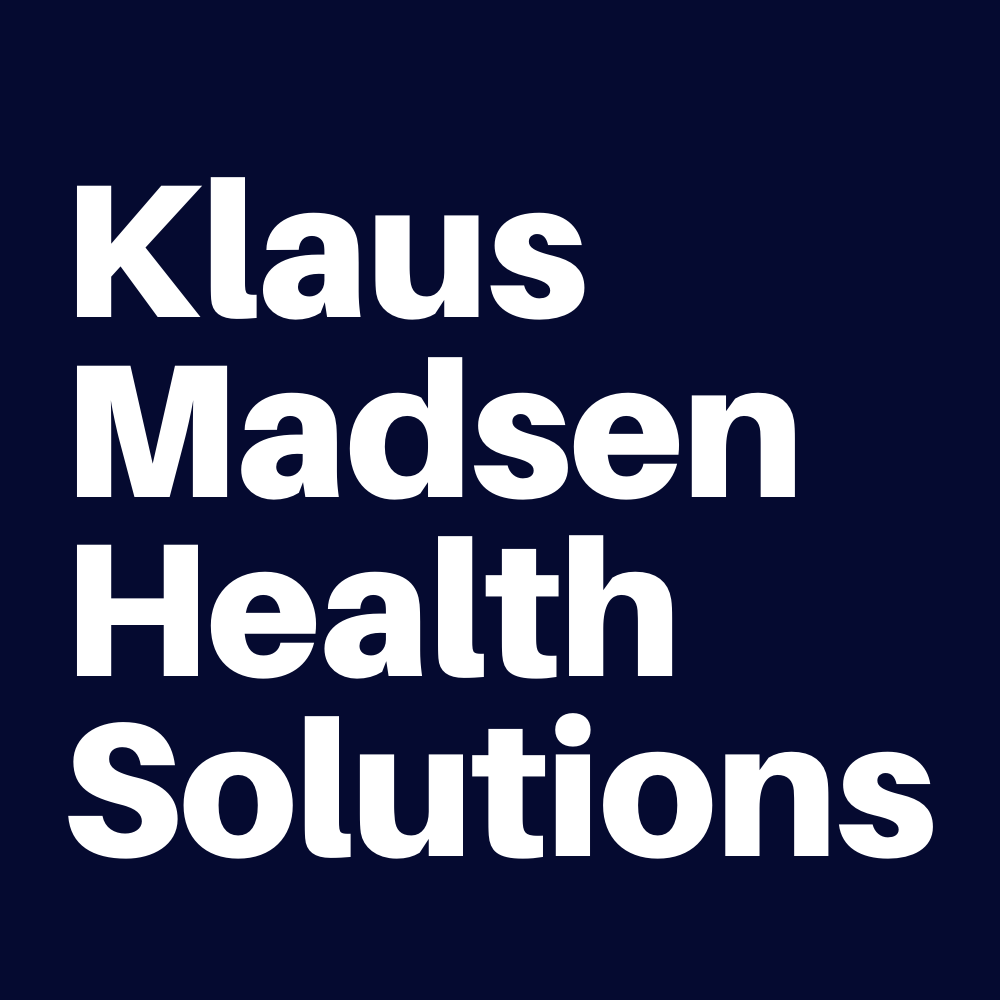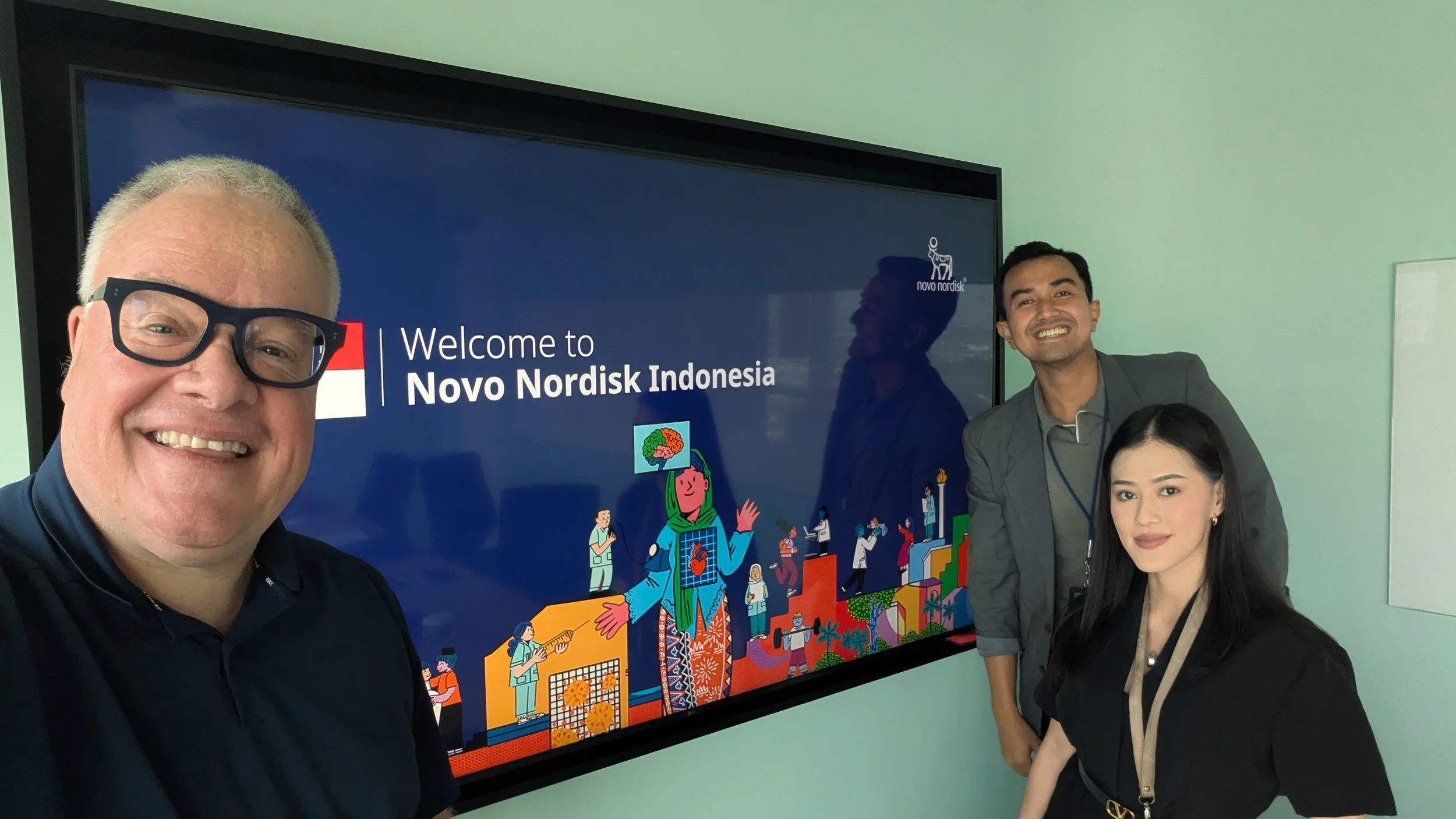Klaus specializes in bridging pharmaceutical and diagnostics innovation with community health needs, creating access partnerships that deliver both social impact and commercial sustainability. With over 10 years advising Novo Nordisk on global access strategies, experience with Roche Diagnostics-funded initiatives, and current work facilitating a Southeast Asian government partnership, Klaus understands how to navigate the complex landscape of public-private health partnerships.
Klaus Madsen with Novo Nordisk Indonesia team facilitating Jakarta Provincial Government partnership for Cities for Better Health
Why Pharmaceutical & Diagnostics Companies Work With Klaus
External Perspective With Industry Knowledge
As an independent consultant rather than an industry employee, Klaus brings fresh thinking unconstrained by internal politics or legacy approaches. Yet his decade-long strategic advisory role with Novo Nordisk provides deep understanding of pharmaceutical business models, CSR imperatives, and commercial constraints. He speaks both industry language and community language fluently.
Proven Scalability
Klaus developed the stakeholder engagement and innovation challenge methodology for Cities Changing Diabetes Philadelphia that Novo Nordisk adopted as their global template—now deployed across three continents attracting 200+ international entries in partnerships with UNICEF and the EAT Foundation. He creates frameworks that work across diverse cultural contexts while maintaining commercial sustainability.
LMIC Market Experience
Klaus's current work facilitating partnership between Novo Nordisk Indonesia and Jakarta Provincial Government provides direct experience navigating LMIC regulatory environments, government health ministries, and multi-stakeholder coalitions at national policy level. He has coached teams in Brazil, Cambodia, Ghana, Mexico, and Mozambique, bringing practical knowledge of barriers and opportunities across emerging markets.
The Trust-Building Advantage
Klaus has a unique ability to build authentic trust with communities who have legitimate reasons to be skeptical of pharmaceutical and diagnostics industry involvement. This capacity delivers measurable business value: accelerated program implementation, higher participation rates, authentic community insights, positive brand reputation, and sustainable partnerships.
Expertise Areas
LMIC Market Entry & Government Partnerships
Navigating regulatory environments and procurement processes
Building relationships with health ministries and national stakeholders
Multi-stakeholder coalition architecture at provincial/national level
Policy partnership and advocacy strategy
Commercial sustainability in resource-constrained environments
Diagnostic Access & Screening Program Design
Community-based diagnostic screening initiatives
Point-of-care testing integration into community health programs
Laboratory partnerships and diagnostic care pathways
Early detection and disease management integration
Commercial models for sustainable diagnostic access
Therapeutic Access & Patient Support Programs
Patient support program design for LMIC contexts
Medication access and adherence strategies
Integration with health systems and community organizations
Disease management program development
Culturally-adapted health education
Integrated Care Pathway Development
Diagnostics-to-therapeutics care pathway design
Screening, diagnosis, treatment, and monitoring integration
Cross-sector collaboration for comprehensive care
Health system strengthening approaches
Sustainable financing across care continuum
Community Co-Creation & Stakeholder Engagement
Innovation challenge design and management
Co-creation methodologies with diverse stakeholders
Community voice integration in product development
Authentic partnership governance structures
Trust-building with skeptical populations
Commercial Sustainability & Alternative Financing
Braided funding models combining multiple sources
Public-private partnership financial architecture
Revenue-generating health equity programs
Pooled procurement facilitation
ROI storytelling and impact measurement
Building Trust With Communities Skeptical of Industry
Many LMIC and underserved communities have experienced exploitation in medical research, unaffordable pricing of essential medicines and diagnostics, lack of meaningful consultation in program design, data privacy violations, and benefits that don't reach the communities who participated. These experiences create understandable distrust that can derail even well-intentioned partnerships.
Klaus addresses these concerns directly rather than avoiding or dismissing them:
Transparent Governance Structures: Communities receive real decision-making power, not just advisory roles
Explicit Discussion of Power Dynamics: Creating space for authentic dialogue about historical harms and current concerns
Community Voice From Inception: Integration from the beginning, not as an afterthought to validate pre-determined plans
Equitable Benefit-Sharing: Ensuring communities receive tangible value beyond data extraction
Cultural Humility: Willingness to learn from lived experience rather than imposing external expertise
Long-Term Relationship Building: Commitment that extends beyond single projects or funding cycles
Proven Track Record
Klaus has successfully built trust with:
Immigrant communities navigating language barriers and cultural differences
Faith institutions serving minority populations (African American, Hispanic, Muslim, South Asian)
Families of incarcerated individuals experiencing stigma and system distrust
Underserved rural residents with limited healthcare access
Indigenous communities (through coaching in Brazil)
Urban populations experiencing health inequities (600+ stakeholders centering voices of people living with diabetes)
Commercial Value of Trust-Building
Accelerated implementation through reduced community resistance
Higher participation rates in screening, research, and intervention programs
Authentic insights improving product-market fit and program design
Positive brand reputation in markets where trust is essential for success
Sustainable partnerships generating long-term value beyond initial investment
Risk mitigation by identifying and addressing concerns before they escalate
Experience Includes
Leading Cities for Better Health (Cities Changing Diabetes) as Novo Nordisk's US stakeholder engagement lead since 2014
Currently advising Novo Nordisk Indonesia on Jakarta Provincial Government partnership
Coaching 20 international teams across 8 countries on pharmaceutical-community partnerships
Designing innovation challenges attracting 200+ global entries for chronic disease prevention
Developing Novo Nordisk & Roche Diagnostics-funded Diabetes Action Plan adopted by 26 US states
Creating Faith & Diabetes model—first global implementation in Cities Changing Diabetes network
Facilitating Novo Nordisk Medical Affairs research partnerships on social determinants of health
Managing CDC Foundation COVID-19 vaccine outreach programs requiring rapid trust-building
Strategic Collaborators
Novo Nordisk (US, Indonesia & Global) | Roche Diagnostics | CDC Foundation | Robert Wood Johnson Foundation | EAT Foundation | UNICEF | WHO | National Institute of Public Health of Mexico | Jakarta Provincial Government | UTHealth | MD Anderson Cancer Center
Recognition & Thought Leadership
Case studies featured in World Economic Forum publications | Presentations to WHO, National Governors Association, Israel Ministry of Health/Commonwealth Fund, National Institute of Public Health (INSP) Mexico | Process blueprints shared across 50 cities in global Cities for Better Health network
Ready to Discuss Your Partnership Goals?
Klaus welcomes inquiries from pharmaceutical and diagnostics companies seeking to:
Enter LMIC markets with authentic community partnerships
Build trust with populations skeptical of industry involvement
Scale innovative access programs across multiple countries
Integrate diagnostics and therapeutics across care pathways
Create commercially sustainable health equity programs

